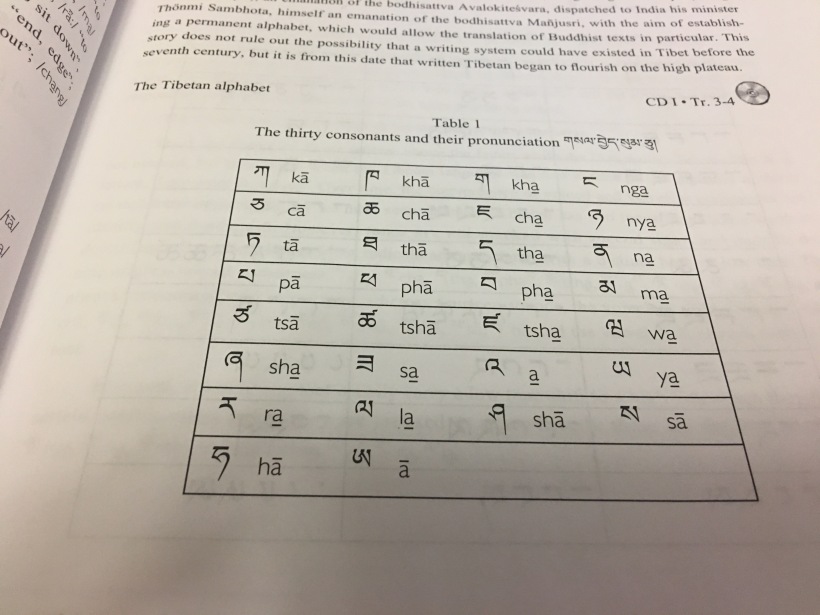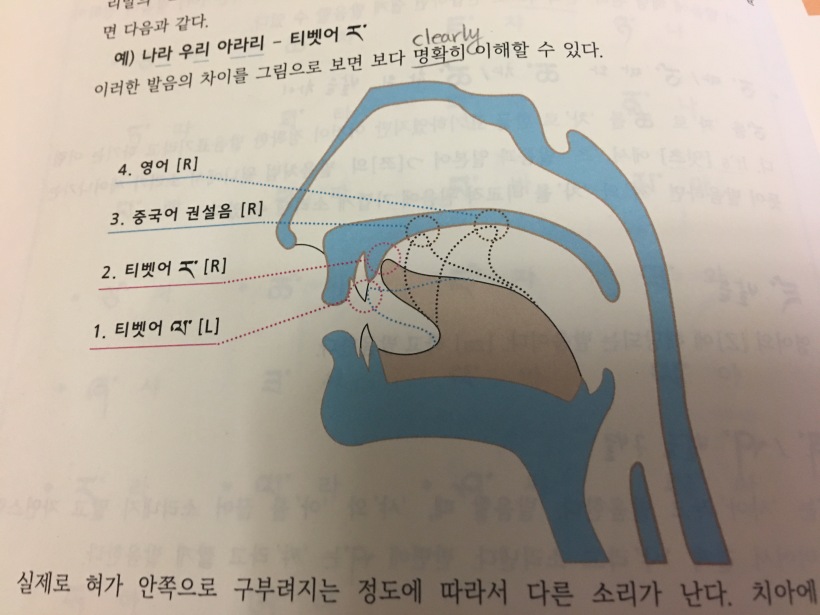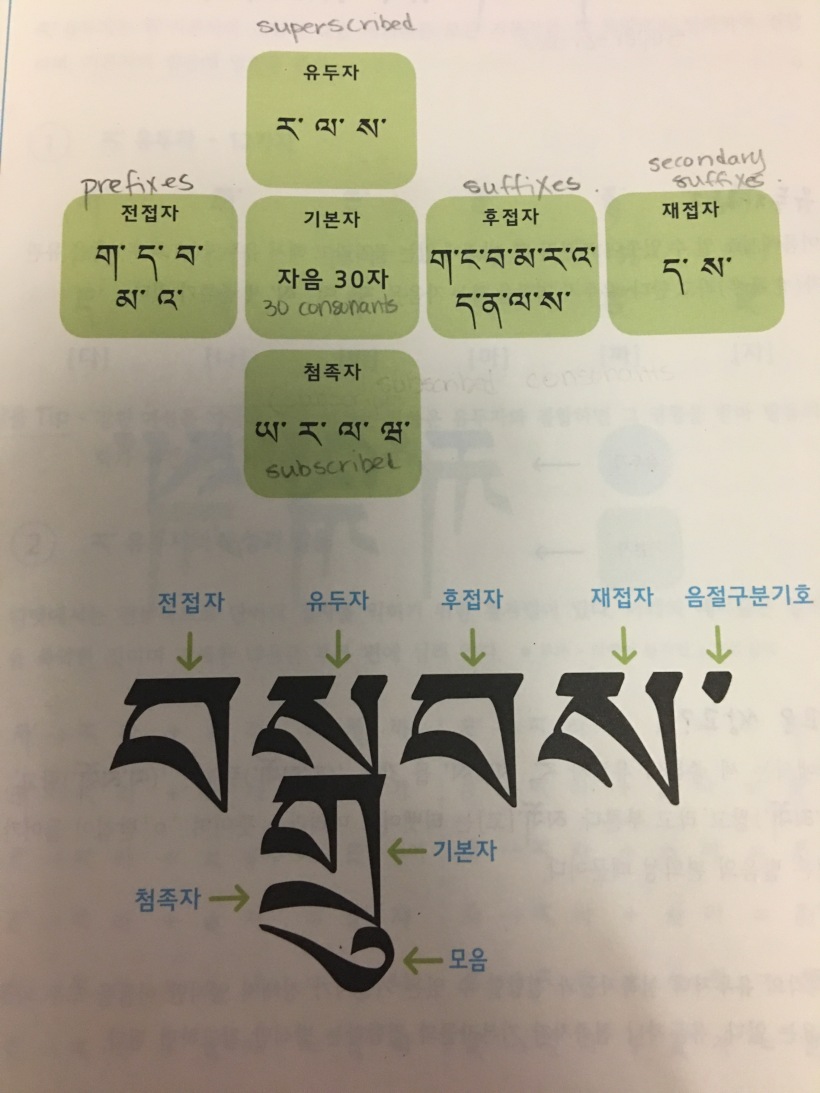
Manual of Standard Tibetan. Colloquial Tibetan. 현대 티벳어.
In my spare time I’ve been trying to teach myself the Tibetan alphabet. I haven’t really gotten that far. I’ve managed to basically remember between 8-12 of the 3o consonants and I remember the 4 vowels. I haven’t made it through the rest of the alphabet though. Some of it is for pronunciation reasons. I feel like I’m close on the pronunciation and at other times I feel like I have no clue if I’m pronouncing it right.
This is due to two factors. I have Tibetan language books in English and Korean. The English books while they have fancy CDs with them drive me crazy with the English equivalent written out in a phonetic alphabet my brain can’t wrap itself around. As I hate thinking about how something is pronounced based on another word in English. Maybe this works for some people, but for me it never does it drives me crazy. The Korean book on the other hand works to an extent as pronunciation is actually very similar for a lot of consonants, with the exception of a few especially the ones that are supposed to contain a ‘z’ sound. Korean is lacking that sound so while the few video lectures are useful with teaching you kind of how to pronounce things it’s basically up to me to remember

Korean pronunciation of the Tibetan Alphabet.
Which is where having an actual teacher would probably do me some good. My current hangup is I don’t want to depend on the English or Korean equivalent for reading practice while learning. For some people its fine as they grasp how to learn to read the language in time, but for me I always find it to be a major stumbling block when learning languages. In the beginning learning through your own language can be a great thing I did it with Korean and Japanese. However, if you linger on the romanized pronunciation of another language for too long it actually hinders your pronunciation. Utilizing that romanization forces your pronunciation to sound like a foreigner verses working towards a more natural pronunciation. It takes a lot of work to sound natural in a foreign language, I never accomplished it in Japanese, but I was told I had good pronunciation. In Korea, I’ve had a number of Koreans compliment me on my pronunciation sounding like a native’s. To me that is a high compliment and it is also something I will strive to achieve while learning Tibetan. I don’t want to be that person that cringes when they hear someone speak the language and realize years later they are still pronouncing vowels like a foreigner would in English versus in the current language they are speaking. Maybe that sounds elitist, but it is not. When you want to learn a language try to sound like a local. The effort is well worth it and there will be variation depending on which region you learn the accent from.

At the moment I’ve been using my Korean book more than my English ones to learn Tibetan. There are a few reasons for that. One the pronunciation is easier to learn through Hangul than English (with a few exceptions). Two Koreans love their online lectures. With that being said I basically can find free online lectures using the Korean textbook to learn Tibetan in Korean. It’s a bit of hindrance if I start getting sidetracked but my Korean is at level where I can sit through a class and follow along in the textbook and learn about how to pronounce consonants.

Diagram showing the differences between pronunciation. 1. Tibetan ‘L’ 2. Tibetan ‘R’ 3. Chinese ‘R’ 4. English ‘R’.
For example, one of the online professors made a diagram of the mouth and showed how ‘r’ is pronounced in English, Korean, Tibetan, and Chinese. Korean doesn’t have a true ‘r’ sound it is more of a mix between r/l depending on where it falls in a word. Where as English speakers we have a strongly pronounced ‘r’ which is different to the strongly pronounced Chinese ‘r’. But through the lecture I’ve learned that a Tibetan ‘r’ is close to how Koreans pronounce the ‘ㄹ’ in ‘나라’ which helps me figure out where I need to put my tongue to pronounce the Tibetan ‘r’ correctly. As Tibetan also has an ‘l’ sound like English, whereas Korean doesn’t. The intricacies of learning another language can be fun and daunting. I’m not sure how anyone quite figures out how to read Tibetan on their own with all the prefixes, first suffixes, second suffixes, subscripts and superscripts assigned to a syllable. Its baffling as hell to me, but I’m sure with time and practice I can figure it out.

All the different parts that make up a word.
Studying languages has always been something that I’ve really enjoyed. My favorite class in high school was Spanish class, of which I’ve forgotten everything. I enjoyed my Japanese classes in College as well as my Saturday Korean classes. I enjoyed my Korean classes on Sundays in Korea as well. And now self-studying Tibetan I wonder if I’d be better scheduling an online class learning a language although I’m not sure how online language learning is or if it is worth it to help me work towards a goal.
Our minds are truly capable of a lot if we work hard at it. Languages are fascinating and they intricately change how we interpret the world. The best part of all is the world opens up to you the more you learn. The more books you can read, the more music you can understand and the more people you can interact with. That in itself should make language learning a great hobby.